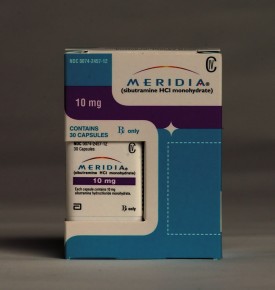Oct. 29, 2010 at 5:36 a.m.
Filed under:
Health care,
Pharmaceuticals,
Policy
By Reuters
Vivus Inc.’s weight-loss drug candidate Qnexa failed to win over U.S. health regulators, who declined to approve the diet pill, asking for evidence related to heart risk and other information.
The Food and Drug Administration told Vivus on Thursday that its new drug application for Qnexa could not approved in its present form. Get the full story »
Oct. 26, 2010 at 12:49 p.m.
Filed under:
Food,
Government,
Packaged foods
By Dow Jones Newswires
The Food and Drug Administration warned Mead Johnson Nutrition Co. about the packaging for some of the company’s Enfamil infant formulas.
In a letter dated Oct. 18 that was posted to the agency’s Web site Tuesday, FDA said Mead Johnson didn’t give the FDA product specifications about a new plastic tub and lid used to store certain types of powdered Enfamil. Get the full story »
Oct. 25, 2010 at 12:36 p.m.
Filed under:
M&A,
Pharmaceuticals
By Reuters
Sam Waksal, the former chief executive of ImClone Systems Inc., whose insider trading scam sent him and Martha Stewart to prison, Monday announced an acquisition meant to catapult him back into the biotech game.
Waksal said that his drug company Kadmon Pharmaceuticals has bought the privately held Three Rivers Pharmaceuticals and that its treatments for hepatitis C, infections and cancer will be the backbone of his new enterprise. Get the full story »
Oct. 19, 2010 at 5:58 a.m.
Filed under:
Pharmaceuticals,
Recalls
By Alejandra Cancino
An Illinois mother is requesting class-action status in a lawsuit she filed against Abbott Laboratories Inc. over the recall of millions of containers of its top-selling Similac powered infant formula, which she claims, sickened her child and thousands of other children.
Abbott recalled the products on Sept. 22, following two reports from consumers stating they had found beetles or larvae in the formula. The insects and larvae were also found during an inspection at the Sturgis plant in Michigan, where the products are made. Get the full story »
Oct. 8, 2010 at 3:20 p.m.
Filed under:
Earnings,
Pharmaceuticals,
Updated
 By Bruce Japsen and Andrew Zajac | Abbott Laboratories said Friday that it would withdraw the diet drug Meridia at the request of the U.S. Food and Drug Administration less than a month after it failed to win over one of the federal agency’s safety advisory panels.
By Bruce Japsen and Andrew Zajac | Abbott Laboratories said Friday that it would withdraw the diet drug Meridia at the request of the U.S. Food and Drug Administration less than a month after it failed to win over one of the federal agency’s safety advisory panels.
The FDA confirmed the North Chicago-based drug giant’s decision, saying Abbott withdrew the drug because of “clinical trial data indicating an increased risk of heart attack and stroke.” Get the full story »
Oct. 7, 2010 at 2:17 p.m.
Filed under:
Pharmaceuticals,
Recalls
By Reuters
Pfizer Inc. said it recalled 191,000 bottles of its top-selling Lipitor cholesterol fighter after reports of a musty odor coming from some bottles of the medicine made by a third-party supplier.
The world’s largest drugmaker said the recall, which took place in mid-August, involved seven lots of 40-milligram Lipitor, as well as three other lots of the medicine supplied to a Canadian generic drugmaker. Five of the seven recalled lots of the branded medicine were in the U.S., with two from Canada, Pfizer said. Get the full story »
Oct. 4, 2010 at 10:14 a.m.
Filed under:
Government,
Pharmaceuticals
By Reuters
U.S. health regulators have requested more data on Johnson & Johnson’s chronic pain treatment before they will approved the product, the company said Monday.
The Food and Drug Administration sent J&J a complete response letter for J&J’s tapentadol extended release tablets. Get the full story »
Sep. 28, 2010 at 12:22 p.m.
Filed under:
Pharmaceuticals,
Retail
By CNN
The Food and Drug Administration on Tuesday warned Johnson & Johnson, CVS and Walgreens to stop making “unproven“ claims that their mouthwash products are effective in removing plaque or preventing gum disease.
In a warning letter sent to each company, regulators specifically targeted Johnson & Johnson’s “Listerine Total Care Anticavity Mouthwash“, CVS’s “CVS Complete Care Anticavity Mouthwash“ and Walgreen’s “Walgreen Mouth Rinse Full Action.” Get the full story »
Sep. 23, 2010 at 12:51 p.m.
Filed under:
Government,
Pharmaceuticals
By Reuters
European regulators said Thursday GlaxoSmithKline’s diabetes drug Avandia should be taken off the market but U.S. officials allowed it to stay, with major restrictions due to concerns about heart risks.
The differing rulings were an attempt to end a row over drug safety that has dogged the reputation of the medicine and its maker in recent years. Get the full story »
Sep. 21, 2010 at 11:49 a.m.
Filed under:
Food,
Government,
Investigations
By Associated Press
A company that has engineered salmon to grow twice as fast as the conventional variety says its food should not be labeled any differently in the grocery store if it is approved by the U.S. government.
The chief executive of the company, Ron Stotish, argued at a Food and Drug Administration hearing Tuesday that genetically modified salmon have the same flavor, texture, color and odor as the conventional fish. Get the full story »
Sep. 21, 2010 at 6:03 a.m.
Filed under:
Government,
Pharmaceuticals
By Reuters
An experimental weight-loss drug made by Vivus Inc. helped obese people lose more than 10 percent of their weight after two years in a clinical trial, but safety details were scant for the drug, which in July was turned down by a panel of U.S. experts.
The company said Tuesday that the second year of a clinical trial found that patients taking the highest dose of its drug, Qnexa, lost an average of 26 pounds, or 11.4 percent of their body weight. Patients taking a placebo had weight loss of 2.5 percent. Get the full story »
Sep. 20, 2010 at 9:58 p.m.
Filed under:
Food,
Updated
By Associated Press

AquaBounty salmon, rear, have an added growth hormone gene from the Chinook salmon to a normal Atlantic salmon, front, that results in a transeni salmon that grown to market size in about half the time as a normal salmon. (AquaBounty/MCT)
Genetically engineered salmon that grows twice as fast as the conventional fish appears to be safe, an advisory committee told the Food and Drug Administration Monday. But they argued that more testing may be needed before it is served on the nation’s dinner tables.
Sep. 17, 2010 at 1:41 p.m.
Filed under:
Government,
Pharmaceuticals
By Dow Jones Newswires
The Food and Drug Administration said Friday that it has started a safety review of Takeda Pharmaceutical Co.’s diabetes drug Actos looking at links to bladder cancer.
The FDA said the review was prompted from preliminary, five-year data from an ongoing study involving the drug. The study, designed to follow patients for 10-years, is being funded by Takeda. Get the full story »
Sep. 16, 2010 at 2:27 p.m.
Filed under:
Government,
Pharmaceuticals
By Bruce Japsen
An advisory panel to the Food and Drug Administration voted against recommending an experimental diet drug known as lorcaserin be approved for marketing.
In a first of several votes to be taken this afternoon, only five members of the panel voted that the drug’s potential benefits to overweight Americans outweigh risks. Nine voted against the drug’s benefits-to-risks ratio. Get the full story »
Sep. 15, 2010 at 5:45 a.m.
Filed under:
Health care,
Pharmaceuticals
By Bruce Japsen
A Food and Drug Administration advisory panel will decide Wednesday whether the diet drug Meridia will remain on the market amid calls that it be removed. And on Thursday, another drug, known as lorcaserin, is up before an advisory committee where its developer will face questions from panelists and a possible recommendation for agency approval.






